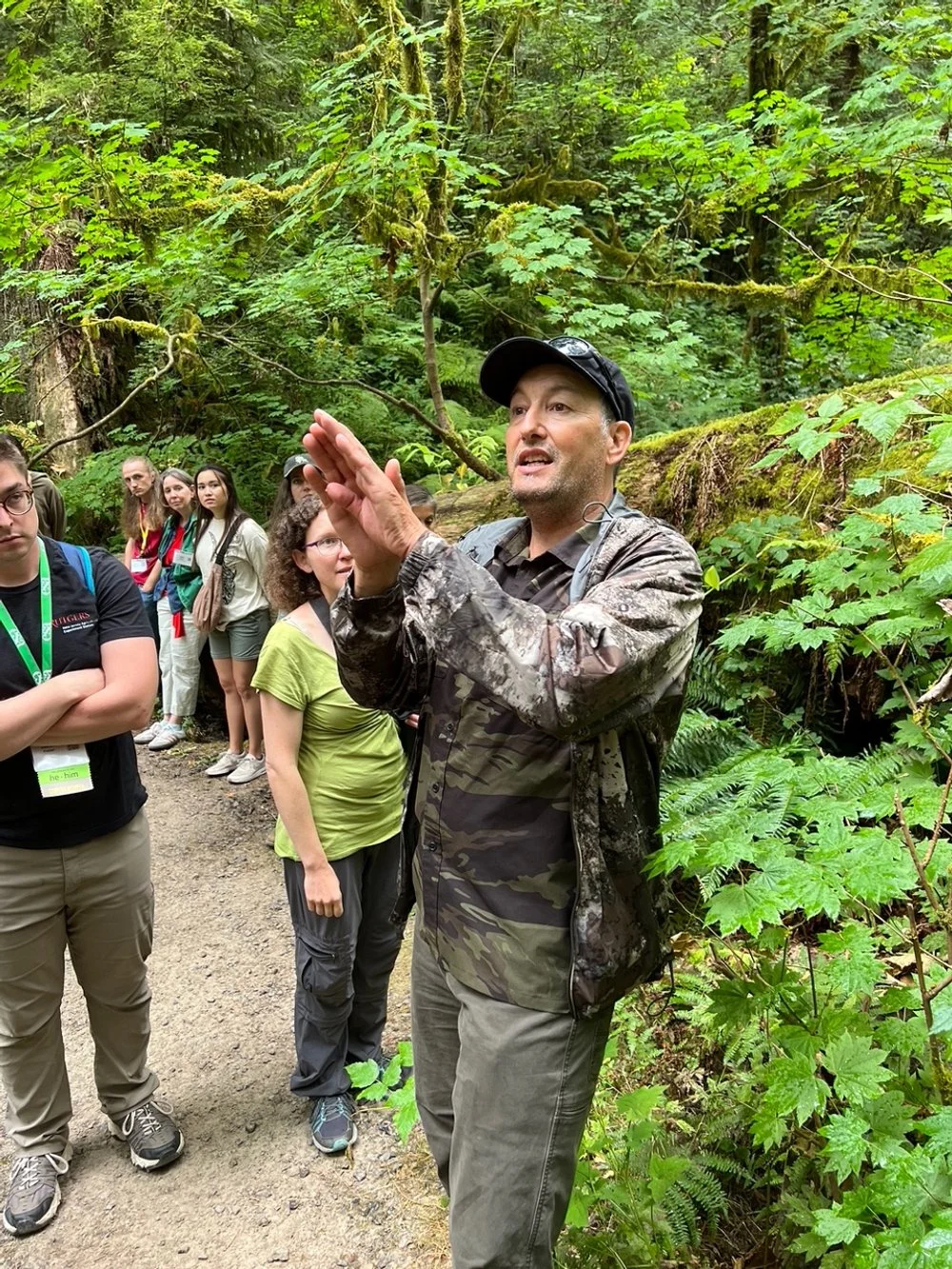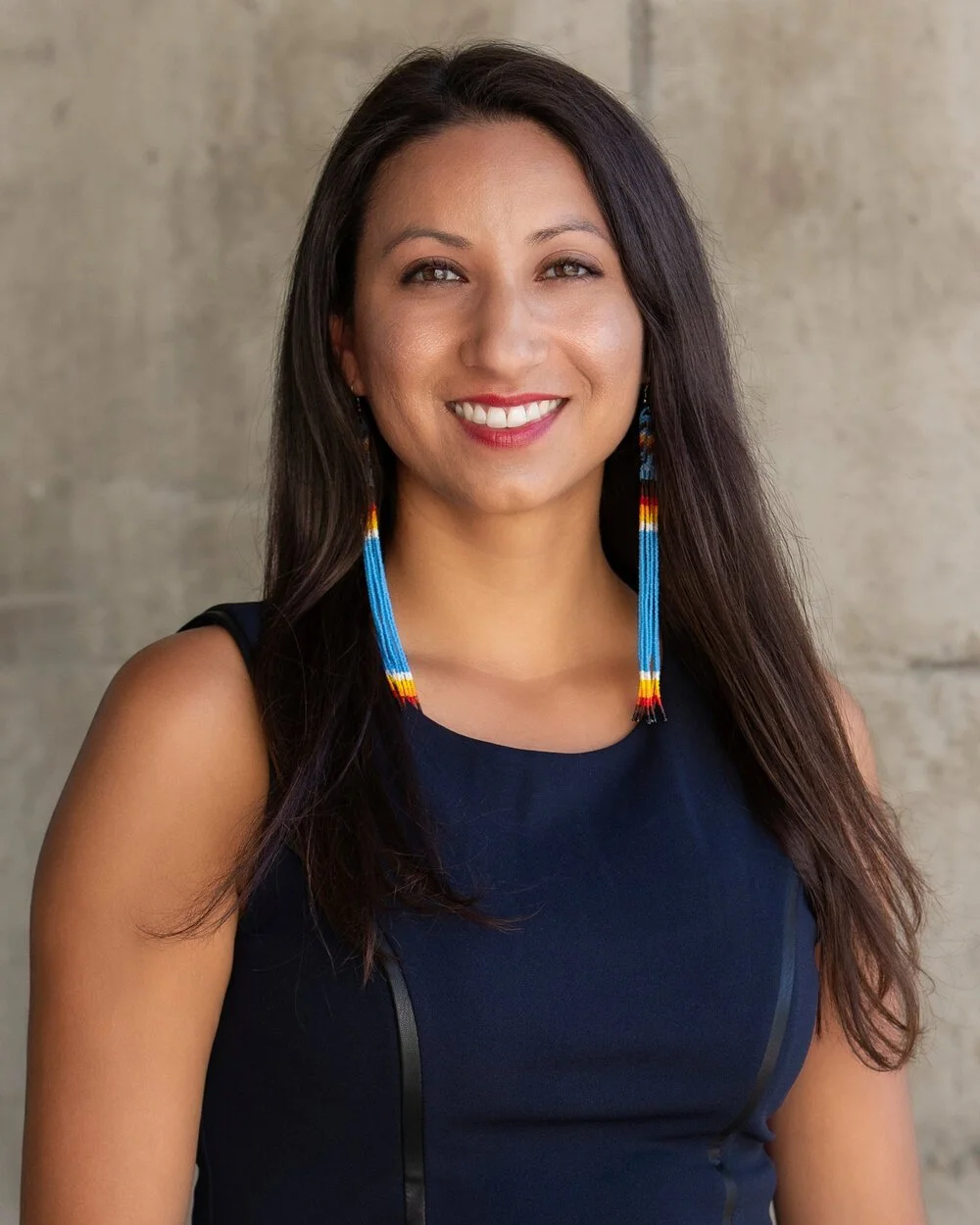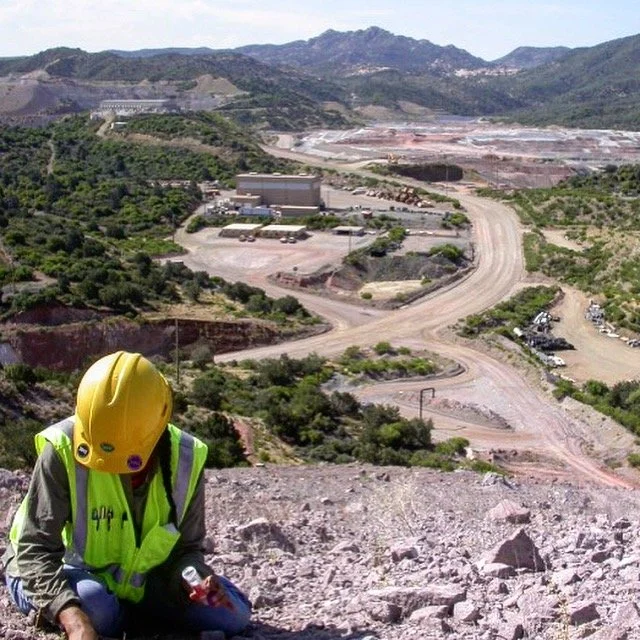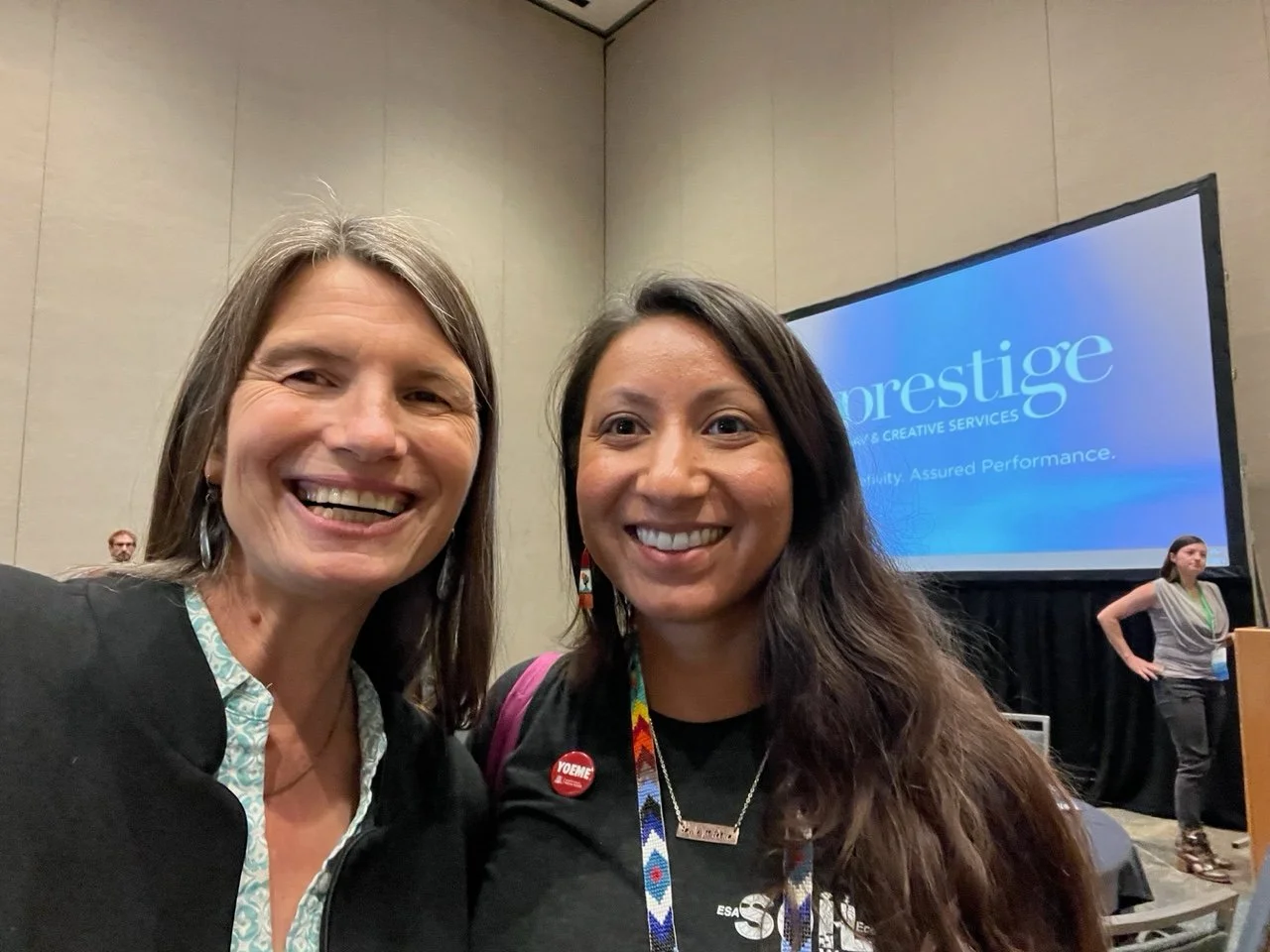Speaker: Frank K. Lake and Lydia Jennings | Air Date: August 5, 2024 | Run Time: 43 mins | Season 4
Photograph by Alexandru Salceanu
TEK is a Verb: Activating Indigenous Ecologies at ESA
In this episode, Melissa Nelson interviews two Native scientist colleagues at the annual 2023 Ecological Society of America conference in Portland, Oregon where they discuss Indigenous ecologies, the history of the TEK section, and data sovereignty.
“Traditional Knowledge or TEK is a responsibility and to be able to put into action the gift of that knowledge and wisdom from the elders and community members ceremonial leaders... what benefits the tribe is also going to benefit society.”
About Frank K. Lake
Frank Kanawha Lake is a Research Ecologist, and the Tribal Liaison/Climate Change contact for the Pacific Southwest Research Station, USDA Forest Service. His research involves wildland fire effects, indigenous knowledge, tribal agroforestry, Climate Change, and ethno-ecology with an emphasis on cultural management and fire ecology of forest, shrub, grassland and riparian environments in the Klamath-Siskiyou and Pacific Northwest regions.
Other projects and research include: American Indian Tribes and Climate Change; Agroforestry practices of Indigenous and tribal people, Indigenous Fire Stewardship/Cultural burning, and Wildland Fire effects on Heritage and Cultural Resources. He mentors and serves as a graduate committee member for several students working on tribal food security, wildland fire, and forest management.
Frank is a Fire Line Qualified Resource Advisory (REAF) working on wildland fires with agencies and tribes. Frank is the Forest Service PSW coordinating scientist to the Western Klamath Restoration Partnership and for the Yurok Redwood Experimental Forest. His current focus is on Indigenous Knowledge data governance regarding the Co-production of Knowledge for research and resource management. Frank is of mixed Native American and European ancestry, being raised with and identifying more with his Karuk and Yurok family’s heritage in Northwestern California.
Photo courtesy of Frank Lake
Lake Property Klamath River TREX burn, October 2015 conducted by Karuk and Yurok ignitors. Photo courtesy of Frank Lake
Frank Lake explaining forest thinning at pre-conference field trip at ESA 2023 in Portland, Oregon. Photo by: Melissa Nelson
Frank Lake with USDA Forest Service and NRCS Scientists, Forest Service Fire Managers, Tribal Elders, discussing Black Oak restoration in the Sierra National Forest, June 2013. Photo by: Jonathan Long, USFS-PSW
About Lydia Jennings
Dr. Lydia Jennings (she/her) is an environmental soil scientist.
Lydia, citizen of the Pascua Yaqui Tribe (Yoeme) and Huichol (Wixáritari), earned her Bachelors of Science from California State University, Monterey Bay in Environmental Science, Technology and Policy.
She completed her Ph.D. at the University of Arizona in the Department of Environmental Sciences, with a minor in American Indian Policy.
Her research interests are in soil health, environmental data stewardship and science communication. Lydia is a 2014 University of Arizona NIEHS Superfund Program trainee, a 2015 recipient of National Science Foundation’s Graduate Research Fellowship Program, a 2019 American Geophysical Union “Voices for Science” Fellow, a 2020 Native Nations Institute Indigenous Data Sovereignty Fellow, and a 2021 Data Science Fellow. Lydia is currently a Presidential Postdoctoral Fellow at Arizona State University’s The School of Sustainability and the Research Fellow at Duke University’s Nicholas School of the Environment.
Outside of her scholarship, Lydia is passionate about connecting her scholarship to outdoor spaces, through running and increasing representation in outdoor recreation.
Dr. Lydia Jennings Pascua Yaqui Nation| University of Arizona, AISES
Article references in Lydia’s interview
“Applying the ‘CARE Principles for Indigenous Data Governance’ to Ecology and Biodiversity Research.” Jennings, L., Anderson, T., Martinez, A., Sterling, R., Chavez, D. D., Garba, I., ... & Carroll, S. R. (2023).
“Genetic Research among the Havasupai: a Cautionary Tale.” Nature Ecology & Evolution, 7(10), 1547-1551.
Field sampling at an Arizona mining site. Photo courtesy of Lydia Jennings
Presenting at the 2019 American Geophysical Union National Conference on my work with establishing biological metrics for mining reclamation in arid ecosystems. Photo credit: Dr. Laura Meredith
Indigenous women scientists representing the TEK section at ESA 2023, Portland, Oregon after speaking together in the TEK Inspire Session. From Left to Right: Gwen Bridge (Cree), TEK Section Chair, Jaime Grimm (Saulteaux), Danielle Ignace (Coeur d’Alene), TEK Section Secretary, Lydia Jennings (Yaqui/Huichol), Melissa Nelson (Turtle Mountain Chippewa), TEK Section Vice-Chair, Ellen Simmons (Cree), Jocelyn Painter (Winnebago), Ruth Ann Plenty Sweetgrass-She-Kills (Hidatsa, Mandan, Dakota, and Nakota). Photo courtesy of Melissa K. Nelson
Melissa Nelson and Lydia Jennings together after Native Seed Pod interview at ESA 2023, Portland, Oregon. Photo by: Melissa K. Nelson
about melissa nelson
Melissa K. Nelson, Ph.D. is an award-winning ecologist, writer, media-maker, and Indigenous scholar-activist. For over 30 years she has been dedicated to Indigenous rights and revitalization and the protection of Native lands and food sovereignty. Melissa is a professor of Indigenous Sustainability at Arizona State University and professor emerita of American Indian Studies at San Francisco State University.
She is board chair of The Cultural Conservancy, an Indigenous rights organization, which she directed as a founding executive director and CEO from 1993 - 2021. Melissa is the co-producer and photographer of the award-winning documentary film, The Salt Song Trail: Bringing Creation Back Together, and has co-produced several other documentary short films with The Cultural Conservancy, the Native American Academy, and Philomath Films. She was a writer and host for the PBS website and documentary film, Circle of Stories, and consultant on the award-winning IMAX film, Into American’s Wild. She has co-produced several audio recordings, including Songscapes of Native America, Profiles of Native American Food Revitalization (with Slow Food USA), Red Earth Rising (with Canyon Records) and Sounds of Belonging (with ASU). In 2018 she co-founded the Native Seed Pod podcast and serves as its primary host and writer. Melissa has also edited and contributed to three anthologies focused on Indigenous ecological knowledges. She is Anishinaabe/Cree/Métis/Norwegian, a proud member of the Turtle Mountain band of Chippewa Indians.
CREDITS
Host/Writer/Director: Melissa Nelson
Producers: Mateo Hinojosa
Co-producer: Raven Marshall, Sara Moncada
Audio Engineering: Colin Farish
Audio Recording: Melissa Nelson
Episode cover photo: Alexandru Salceanu
Original Soundscapes and Songs
Soundscapes and Music Composed and Produced by Colin Farish
Listen to more of Colin’s music at colinfarish.com
Song credits
Music and soundscapes composed, produced, arranged by Colin Farish
Featuring:
Opening Frame Drums: Glen Velez
Drums: Capomo
Kanyon Chumash Grandmother Song: Kanyon Sayers-Roods
Tongva Song: L Frank Manriquez
Excerpts from Colin Farish’s 2024 Mesa Bluemoon release, Acoustic Menagerie:
“Chase Play part 2”
Colin Farish – piano
Jhaffur Khan – bansuri flute
Stan Poplin – bass
Shabda Al Owens – voice
Savannah Jo Lock – voice
Jaron Lanier – xun
“Acoustic Menagerie part 2”
Colin Farish- piano, frame drum
Paul McCandless – oboe, soprano sax
Savannah Jo Lack – violin
Don Lax – violin
Jose Luis De La Paz – guitar
Kyle Lemle – voice
Stan Poplin – bass
Throat Singers from Tuva – throat singing
Composed, produced, & arranged by Colin Farish
Winds of the Muse 2024 ASCAP
The Native Seed Pod is produced by The Cultural Conservancy













